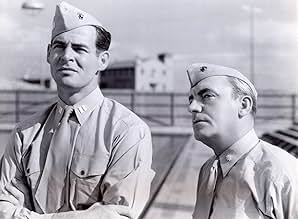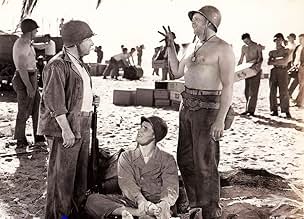A U.S. Marine major tries to keep his captain on the right track through combat on Guadalcanal, training new recruits in San Diego, and a relationship with a WAAAF while on leave in Australi... Read allA U.S. Marine major tries to keep his captain on the right track through combat on Guadalcanal, training new recruits in San Diego, and a relationship with a WAAAF while on leave in Australia.A U.S. Marine major tries to keep his captain on the right track through combat on Guadalcanal, training new recruits in San Diego, and a relationship with a WAAAF while on leave in Australia.
Martha Vickers
- Sally Parker
- (as Martha MacVicar)
Steve Barclay
- A Soldier
- (uncredited)
Tom Burton
- Orderly
- (uncredited)
Patricia Cameron
- Nurse
- (uncredited)
Gordon Carveth
- Truck Driver
- (uncredited)
Featured reviews
The last film Robert Ryan made at RKO before he temporarily quit movies for the real thing. It benefits from photography by later film noir maestro Nicholas Musuraca, with whom Ryan would work again under more auspicious circumstances (and also contains a fleeting appearance by Martha MacVickers, soon to play psychotic nympho Carmen Sternwood in 'The Big Sleep').
Although Pat O'Brien's officially the star it's Ryan who carries the film, and it was already clear he was no ordinary hunk.
Although Pat O'Brien's officially the star it's Ryan who carries the film, and it was already clear he was no ordinary hunk.
Sometimes it's hard to keep track of all the pro-America war movies Hollywood cranked out during the height of WWII. A lot of them had similar names, too! Pride of the Marines, Salute to the Marines, Marine Raiders, Call Out the Marines, We Are the Marines, and maybe more, were all made between 1942 and 1945. The one in the middle of the list stars Pat O'Brien as a commander who oversees training leading up to battle in Guadalcanal. He and his captain, Robert Ryan, aren't thrilled about taking all the new boys under their wing. They want to get to the fighting - but as we all know, there will be plenty of time for that.
Although the main focus of the movie is the Marines, honestly, the romance is more memorable. I never thought I'd see the movie where Robert Ryan leads a gusto-filled waltz. But in Marine Raiders, he dances with Ruth Hussey until the restaurant owner kicks them out in the wee hours of the morning. Robert grins, "We've got a lot more swirling to do!" and keeps dancing. How is it possible that such an adorable, sweet fellow would get typecast as a bad guy the rest of his career? Maybe after he joined the Marines (right after this movie!) and became a drill sergeant, the men he trained were just used to his toughness and shouting. Or maybe it was just Crossfire. Crossfire was his first villainous role, and I don't think he ever bounced back from it.
Ruth is dutifully doing her part for the war effort, and they go through the pros and cons of getting married before the war and risking Ruth becoming a widow, or waiting until Robert returns - if he does. Ruth is a very patriotic lady, and her final scene probably had the women in the audience (during 1944) reaching for their handkerchiefs. This movie has a clear message, one that rings as true now as it did then: Bless them all!
Although the main focus of the movie is the Marines, honestly, the romance is more memorable. I never thought I'd see the movie where Robert Ryan leads a gusto-filled waltz. But in Marine Raiders, he dances with Ruth Hussey until the restaurant owner kicks them out in the wee hours of the morning. Robert grins, "We've got a lot more swirling to do!" and keeps dancing. How is it possible that such an adorable, sweet fellow would get typecast as a bad guy the rest of his career? Maybe after he joined the Marines (right after this movie!) and became a drill sergeant, the men he trained were just used to his toughness and shouting. Or maybe it was just Crossfire. Crossfire was his first villainous role, and I don't think he ever bounced back from it.
Ruth is dutifully doing her part for the war effort, and they go through the pros and cons of getting married before the war and risking Ruth becoming a widow, or waiting until Robert returns - if he does. Ruth is a very patriotic lady, and her final scene probably had the women in the audience (during 1944) reaching for their handkerchiefs. This movie has a clear message, one that rings as true now as it did then: Bless them all!
War soft drama directed by Harold Schuster (On the Sunny Side) featuring the US Marine Corps during the Pacific War against Japan. In the fall of 1942 at Guadalcanal, a kind of Stalingrad-like battle in South Pacific, the Marine Raiders led by the major Steve (Pat O'Brien, The Navy comes through) with the help of his captain Dan (Robert Ryan, Behind the Rising Sun) fight at night the Japanese in the jungle. As lieutenant Tony (Russell Wade, The Ghost Ship) is found "horribly mutilated" by the enemy, a hot-tempered Dan avenges him, but Steve rebukes him for being too imprudent: the reasonable way of acting is thus opposed to the impulsive one. In the meanwhile, the sergents Louie (Frank McHugh, A Medal for Benny) and Maguire (Barton MacLane, Bombardier) argue about the way of putting pepper in the soup, making the comic counterpoint of the two main characters.
As they now rest in their rear camp in Australia, Dan meets Ellen (Ruth Hussey, Tender Comrade), a woman auxiliary in the Australian Air Force, and they fall in love. They plan to get married quick, but as Dan is injured in a Japanese bombing, Steve objects to the impatient and sudden decision of his friend and he makes him sent back with him to the San Diego Marine camp in California. Here they train the new recruits to join the rising corps of the Marines, but Dan, without any news from Ellen, longs to go back for action in the Pacific.
As the camp commander (Edward Fielding, Pacific Rendezvous) hesitates to send Dan back to fighting, Steve talks in his favor and they both go to take part, one year after their previous battle, in the liberation campaign of the strategic Bougainville island in the Australian mandated Territory of New Guinea. Will Dan be able to retrieve his beloved Ellen and shall they manage to carry on their goals? Will Dan and Steve find the right way to fight alongside in spite of their sharply different attitudes within this "largest invading force in the history of the Pacific area"? The plot follows the becoming of the characters in this film dedicated to the Marine Corps efforts to win the war.
As they now rest in their rear camp in Australia, Dan meets Ellen (Ruth Hussey, Tender Comrade), a woman auxiliary in the Australian Air Force, and they fall in love. They plan to get married quick, but as Dan is injured in a Japanese bombing, Steve objects to the impatient and sudden decision of his friend and he makes him sent back with him to the San Diego Marine camp in California. Here they train the new recruits to join the rising corps of the Marines, but Dan, without any news from Ellen, longs to go back for action in the Pacific.
As the camp commander (Edward Fielding, Pacific Rendezvous) hesitates to send Dan back to fighting, Steve talks in his favor and they both go to take part, one year after their previous battle, in the liberation campaign of the strategic Bougainville island in the Australian mandated Territory of New Guinea. Will Dan be able to retrieve his beloved Ellen and shall they manage to carry on their goals? Will Dan and Steve find the right way to fight alongside in spite of their sharply different attitudes within this "largest invading force in the history of the Pacific area"? The plot follows the becoming of the characters in this film dedicated to the Marine Corps efforts to win the war.
I was bored during the watching of this film, because it remains a propaganda war film from Hollywood and destined to promote the US Army. You have Robert Ryan and Pat O'Brien, so it's not totally useless and I expected far far more footage stock shots in this war fikm, totally predictable. I sometimes used the fast forward button on my VCR - yes I only got it in my library in VHS, from the late eighties, and I totally forgotten it. I can understand why now. Harold Schuster is also a director from whom I tracked the movies down. But he made more interesting films: DRAGONWELLS MASSACRE or LOOPHOLE for instance or JACK SLADE and RETURN OF JACK SLADE. His last part of career, I ignored his first one, including some FLICKA adventures. Rubbish....
The jungle battle scenes in opening of this film incorporate an atmosphere one usually finds in film noir. The portrayal of Guadalcanal and the related background music tend in this direction, which was not found in many of the war movies of 1944. Special credit should be given to the director of lighting, especially relative to the deep three-dimensional effect created with the interplay of light and dark.
Did you know
- TriviaRobert Ryan (Capt. Craig) enlisted in the Marines after this film was made and spent most of the war as a Drill Instructor at Camp Pendleton, California before being discharged in November of 1945. He would not appear in another film until Du sang sur la piste (1947).
- GoofsAs Pat O'Brien and Robert Ryan are walking down the street, toward the USO. They can be seen to salute twice. The first time as they are walking down the street no member of military can be seen. Only men wearing fedora's and civilian clothes are seen walking down the street.
- Quotes
Lt. Ellen Foster: You look lovely.
Capt. Dan Craig: A marine's not supposed to look lovely.
Lt. Ellen Foster: You do.
- Crazy creditsOpening credits prologue: (tickertape) 12 SEPT. 1942 ...... IN THE SOUTHWEST PACIFIC UNITED STATES MARINES ON GUADALCANAL LAST NIGHT ENGAGED IN MINOR SKIRMISHES AND PATROL ACTIVITY. JAPANESE REINFORCEMENTS ARE BELIEVED TO HAVE BEEN LANDED. OUR POSITIONS REMAIN INTACT.
Details
- Runtime1 hour 30 minutes
- Color
- Aspect ratio
- 1.37 : 1
Contribute to this page
Suggest an edit or add missing content




































